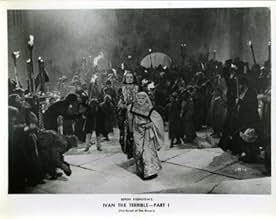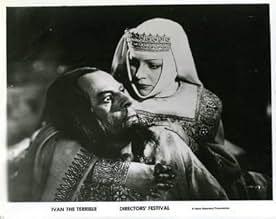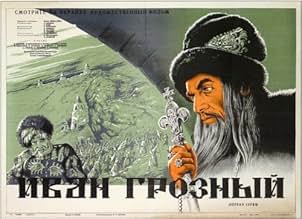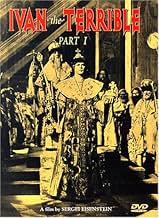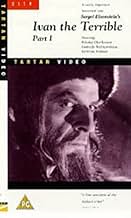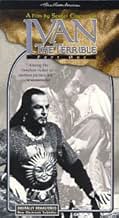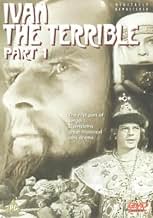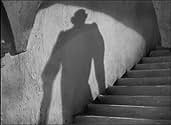AVALIAÇÃO DA IMDb
7,7/10
11 mil
SUA AVALIAÇÃO
Durante a primeira parte de seu reinado, Ivan, o Terrível, enfrenta a traição da aristocracia e até mesmo de seus amigos mais próximos, enquanto procura unir o povo russo.Durante a primeira parte de seu reinado, Ivan, o Terrível, enfrenta a traição da aristocracia e até mesmo de seus amigos mais próximos, enquanto procura unir o povo russo.Durante a primeira parte de seu reinado, Ivan, o Terrível, enfrenta a traição da aristocracia e até mesmo de seus amigos mais próximos, enquanto procura unir o povo russo.
- Direção
- Roteirista
- Artistas
- Prêmios
- 2 vitórias e 1 indicação no total
Aleksandr Rumnev
- The Stranger
- (as Aleksandr Rumnyov)
Avaliações em destaque
This first part of Eisenstein's filming of the life and times of "Ivan the Terrible" has lots of drama, very good characterizations, fascinating settings, and plenty of action. Nikolai Cherkasov is completely convincing in the lead role, and the rest of the cast complements him well (especially Serafima Birman as his crafty aunt). This period in history is quite interesting and significant in itself, and Eisenstein presents everything in a fashion that is thoughtful and also enjoyable to watch.
Ivan combined a remorseless personal ambition with a genuine desire to strengthen and protect Russia, while the boyars, who opposed him, acted from motives that were almost exclusively personal. Combined with the plans of Russia's neighbors, all of this makes for a complex and interesting series of events, and the movie does a good job of presenting both the events and the possibilities, both on the surface and behind the scenes. Not the least of the reasons why it works so well are the settings. They are always interesting, believable, and atmospheric - and the indoor settings are especially so.
Part One is praiseworthy both in its own right and as the foundation for the outstanding sequel. Eisenstein generally excelled at depicting important periods in his country's history, and his series on Ivan's critical reign demonstrates all of his many skills. His attention to detail (of which there are too many examples even to try to list) and his appreciation for the overall picture make this a memorable film of high quality.
Ivan combined a remorseless personal ambition with a genuine desire to strengthen and protect Russia, while the boyars, who opposed him, acted from motives that were almost exclusively personal. Combined with the plans of Russia's neighbors, all of this makes for a complex and interesting series of events, and the movie does a good job of presenting both the events and the possibilities, both on the surface and behind the scenes. Not the least of the reasons why it works so well are the settings. They are always interesting, believable, and atmospheric - and the indoor settings are especially so.
Part One is praiseworthy both in its own right and as the foundation for the outstanding sequel. Eisenstein generally excelled at depicting important periods in his country's history, and his series on Ivan's critical reign demonstrates all of his many skills. His attention to detail (of which there are too many examples even to try to list) and his appreciation for the overall picture make this a memorable film of high quality.
Despite spending his career under an increasingly restrictive regime which regarded cinema as a tool to propagate the government line and needed only the slightest excuse to censor or ban pictures, Sergei Eisenstein always had his own ideas and agendas which shone through the propaganda. Ivan the Terrible was commissioned by the Soviet government to glorify a dead dictator, with whom the living dictator (Stalin) identified, but in Eisenstein's hands it became much more than that one of the greatest studies of power in the history of cinema.
Ivan the Terrible is primarily concerned with the conflict between the institutional power of the system and the charismatic power of individuals. This theme is all set up in the opening scene. It begins with a shot of the crown, and then goes through the various rituals of Ivan's coronation, whilst in the background various dignitaries whisper their doubts to each other. Ivan's face is not even shown until the crown goes on his head. It's clear at this point that we are seeing the creation of a symbolic figurehead tsar the rituals and symbols of power mean more than the man himself. However, when Ivan begins to speak he talks of uniting Russia and ruling with an iron fist. From the series of reaction shots, we are told straight away that the assorted aristocrats, state officials and clergymen wanted a puppet ruler, and are now horrified. Throughout the film Eisenstein uses this kind of cinematic shorthand to reveal the shifting loyalties and private thoughts of characters. More than any other film I can think of, you can understand what is going on in Ivan the Terrible without needing to understand the dialogue or see the subtitles the story is told purely in images.
Although Eisenstein had been making films for twenty years before this, it's clear his style was still evolving. He editing technique prior to this was mostly used to enhance action sequences or make political points through comparisons. Now he uses it to convey emotions and relations between characters. If he had lived a little longer he could perhaps have broadened his horizons and become a director of dramas. Still, as with his previous works this is a story told more through the masses of people not through the individuals.
Perhaps the biggest change between Eisenstein's early silent works and these later sound films is in their level of stylisation. While the silent films may have been very visually dynamic, the way they were staged and acted was essentially realist the crowds, the action, the set ups all looked authentic. Ivan the Terrible on the other hand is theatrical, almost operatic stentorian voices, exaggerated gestures and outlandish looking characters. One thing along these lines that is consistent throughout all his pictures (and was sometimes at odds with the realism of his earlier work) is the way in which he cast and directed his actors so as to leave no doubts as to their character. While the lead roles were filled by strikingly good-looking actors, the villains were often painfully ugly, and are often made to look ridiculous in the way they act. Look at, for example, Ivan's rival for the throne Vladimir, whom Eisenstein turns into a half-wit with a vacant expression. He also likes to remind us of animals for example the conniving, hunchbacked diplomat who resembles some kind of crow.
Eisenstein also here takes on an expressionist look for the first time very en vogue in Hollywood at the time, but virtually an unknown movement in Soviet cinema. Ivan the Terrible is set largely in dim, grimy interiors in contrast to earlier Eisenstein pictures which took place largely outdoors so the grainy, moody look is quite appropriate. He pays a great deal of attention to lighting, with characters often throwing large shadows against walls very much in the style of Fritz Lang and Michael Curtiz.
Of the two completed parts of Ivan the Terrible (there was to be a third, but it was axed by the government during production), I personally prefer the second. They are more or less identical in style, but Part 1 is made up of a series of short episodes and is a little less engaging. The coronation and wedding scenes are perfectly constructed, and the war on Kazan is up there with the battle scenes in Aleksandr Nevsky. I find the later scenes with Ivan's brush with death and his self-imposed exile a little slow, even though they are still incredibly well made.
Ivan the Terrible is primarily concerned with the conflict between the institutional power of the system and the charismatic power of individuals. This theme is all set up in the opening scene. It begins with a shot of the crown, and then goes through the various rituals of Ivan's coronation, whilst in the background various dignitaries whisper their doubts to each other. Ivan's face is not even shown until the crown goes on his head. It's clear at this point that we are seeing the creation of a symbolic figurehead tsar the rituals and symbols of power mean more than the man himself. However, when Ivan begins to speak he talks of uniting Russia and ruling with an iron fist. From the series of reaction shots, we are told straight away that the assorted aristocrats, state officials and clergymen wanted a puppet ruler, and are now horrified. Throughout the film Eisenstein uses this kind of cinematic shorthand to reveal the shifting loyalties and private thoughts of characters. More than any other film I can think of, you can understand what is going on in Ivan the Terrible without needing to understand the dialogue or see the subtitles the story is told purely in images.
Although Eisenstein had been making films for twenty years before this, it's clear his style was still evolving. He editing technique prior to this was mostly used to enhance action sequences or make political points through comparisons. Now he uses it to convey emotions and relations between characters. If he had lived a little longer he could perhaps have broadened his horizons and become a director of dramas. Still, as with his previous works this is a story told more through the masses of people not through the individuals.
Perhaps the biggest change between Eisenstein's early silent works and these later sound films is in their level of stylisation. While the silent films may have been very visually dynamic, the way they were staged and acted was essentially realist the crowds, the action, the set ups all looked authentic. Ivan the Terrible on the other hand is theatrical, almost operatic stentorian voices, exaggerated gestures and outlandish looking characters. One thing along these lines that is consistent throughout all his pictures (and was sometimes at odds with the realism of his earlier work) is the way in which he cast and directed his actors so as to leave no doubts as to their character. While the lead roles were filled by strikingly good-looking actors, the villains were often painfully ugly, and are often made to look ridiculous in the way they act. Look at, for example, Ivan's rival for the throne Vladimir, whom Eisenstein turns into a half-wit with a vacant expression. He also likes to remind us of animals for example the conniving, hunchbacked diplomat who resembles some kind of crow.
Eisenstein also here takes on an expressionist look for the first time very en vogue in Hollywood at the time, but virtually an unknown movement in Soviet cinema. Ivan the Terrible is set largely in dim, grimy interiors in contrast to earlier Eisenstein pictures which took place largely outdoors so the grainy, moody look is quite appropriate. He pays a great deal of attention to lighting, with characters often throwing large shadows against walls very much in the style of Fritz Lang and Michael Curtiz.
Of the two completed parts of Ivan the Terrible (there was to be a third, but it was axed by the government during production), I personally prefer the second. They are more or less identical in style, but Part 1 is made up of a series of short episodes and is a little less engaging. The coronation and wedding scenes are perfectly constructed, and the war on Kazan is up there with the battle scenes in Aleksandr Nevsky. I find the later scenes with Ivan's brush with death and his self-imposed exile a little slow, even though they are still incredibly well made.
10zetes
Before I new much about him, when I used to see the box for Alexander Nevsky on the Foreign shelf at my local video store, I always misread Eisenstein's name, transforming it into Einstein. Well, Einstein suits him just as well, for what Albert Einstein was to science Sergei Eisenstein is to the cinema. Witness Battleship Potemkin, possibly the most rousing film ever made. Today, nearly 80 years after it was made, it still has the power to inspire revolution. Its amazing montage editing style may have died with silent cinema (although there are at least two directors today who are somewhat similar: Shinya Tsukamoto and Darren Aranofsky), but it will never be forgotten.
When Eisenstein moved to sound, he realized that rapid montage would not work in the new medium. He adapted his style, perfecting a new one. Alexander Nevsky and the two Ivan the Terrible films come off to many people as stale historical epics. To me, they come off as the very peak of that genre. Usually I do find historical epics stuffy, but the direction, acting, writing, cinematography, and music of these three films are exquisite, so far beyond anything that I've ever seen that these films stir me nearly as much as Potemkin does.
Ivan the Terrible I is a bit confusing in its plot to begin with, but you have to stick with it. First off, there are many, many characters. A great many are not mentioned by name, and most of the rest are only named on rare occasions. But Eisenstein familiarizes us with the characters' faces. These faces are perfectly chosen and lighted spectacularly. The light is so harsh that every crag in a person's face is clear, and noses cast foreboding shadows. The way time progresses in this film is without much warning, and one problem I encountered was identifying Ivan himself. I did not catch on at first when the first sequence ended and the second sequence began, and Ivan, in the second sequence, has a beard. Once you realize that, though, you're home free. That beard serves as a great identifier throughout the film (and is used in many ways by Eisenstein).
I was expecting to like this film, but I found myself obsessed with this utter masterpiece. 10/10
When Eisenstein moved to sound, he realized that rapid montage would not work in the new medium. He adapted his style, perfecting a new one. Alexander Nevsky and the two Ivan the Terrible films come off to many people as stale historical epics. To me, they come off as the very peak of that genre. Usually I do find historical epics stuffy, but the direction, acting, writing, cinematography, and music of these three films are exquisite, so far beyond anything that I've ever seen that these films stir me nearly as much as Potemkin does.
Ivan the Terrible I is a bit confusing in its plot to begin with, but you have to stick with it. First off, there are many, many characters. A great many are not mentioned by name, and most of the rest are only named on rare occasions. But Eisenstein familiarizes us with the characters' faces. These faces are perfectly chosen and lighted spectacularly. The light is so harsh that every crag in a person's face is clear, and noses cast foreboding shadows. The way time progresses in this film is without much warning, and one problem I encountered was identifying Ivan himself. I did not catch on at first when the first sequence ended and the second sequence began, and Ivan, in the second sequence, has a beard. Once you realize that, though, you're home free. That beard serves as a great identifier throughout the film (and is used in many ways by Eisenstein).
I was expecting to like this film, but I found myself obsessed with this utter masterpiece. 10/10
Eisenstein's 'Ivan the Terrible' once featured in an American book of the 50 worst films of all times, along with 'Attack of the Killer Tomatoes' and 'Plan 9 from Outer Space'.
But as true cinemaniacs acknowledge, 'Ivan', along with 'Ivan the Terrible Part 2', is one of the great masterpieces of the screen. Its style is highly artificial, the acting operatic with no condescension to realism. But the viewer is swept away by the stylised pacing, the way each scene is so precisely plotted and designed -- each camera shot becomes a precious ornamented jewel. The film is, like the earlier 'Alexander Nevsky', as much a vehicle for the great Russian composer Prokofiev as for Eisenstein -- the two attained a cinematic union of image and music which has been rarely equaled since.
The two 'Image' Region 1 DVDs for Ivan Parts One and Two are spartan affairs, with no added features. The orchestral soundtrack is definitely low-fi. But the print sources must have been excellent -- the black-and-white prints are as lustrous as the finest modern movie, the images sharp and clear. And when the film suddenly switches from black-and-white and erupts in colour, the colour is dense and brilliant, unlike the bleached and pale versions usually doing the art-cinema rounds.
How fantastic to have available such treasures on DVD, in such pristine condition! Buy! Buy! Buy!
But as true cinemaniacs acknowledge, 'Ivan', along with 'Ivan the Terrible Part 2', is one of the great masterpieces of the screen. Its style is highly artificial, the acting operatic with no condescension to realism. But the viewer is swept away by the stylised pacing, the way each scene is so precisely plotted and designed -- each camera shot becomes a precious ornamented jewel. The film is, like the earlier 'Alexander Nevsky', as much a vehicle for the great Russian composer Prokofiev as for Eisenstein -- the two attained a cinematic union of image and music which has been rarely equaled since.
The two 'Image' Region 1 DVDs for Ivan Parts One and Two are spartan affairs, with no added features. The orchestral soundtrack is definitely low-fi. But the print sources must have been excellent -- the black-and-white prints are as lustrous as the finest modern movie, the images sharp and clear. And when the film suddenly switches from black-and-white and erupts in colour, the colour is dense and brilliant, unlike the bleached and pale versions usually doing the art-cinema rounds.
How fantastic to have available such treasures on DVD, in such pristine condition! Buy! Buy! Buy!
Ivan the Terrible, Parts One and Two are films when combined) are in the top ten films of all time, and are of enormous genius, but because of this are not easy to digest. The story of the tortured Ivan the Terrible, first Czar of Russia, from boyhood to near the end of his czarhood, it was filmed with extravagated acting, and each scene having multiple symbolic interpretations. For example, all the main characters or groups of characters are portrayed with the characteristics of animals, Ivan the Terrible being a bird. The cinematography is brilliant, and strangely beautiful, relying on parallels, and close ups of the characters (this is among the first films to have this technique, now one of the most common cinematography techniques). Because this film is such a classic, it will make watchers review it, and think on the film itself. As such, it is not "light" watching. It is most definitely one of the greatest films of all time, and is worth the time without question. Do not be held back by the black and white or that it is in Russian. Also, watch both Part One, and Part Two, they were meant to work off each other. The DVD contains what remains of the incomplete Part Three, which the director Sergei Ensenstein did not finish. When told by phone that Stalin would not allow for Part Two to be distributed in Russia and be vaulted due to it's anti-Communistic implications, Ensenstien hung up the phone, and promptly died by heart attack, leaving a trilogy without its ending.
Você sabia?
- CuriosidadesTook over 3 years to make.
- Erros de gravaçãoAfter Anastasia's death, when discussing the Livonian war the "only" son of the Czar is mentioned. However at the time Ivan had two sons, Feodor, who became Czar Feodor I of Russia, and also Tsarevich Ivan Ivanovich.
- Citações
Czar Ivan IV: Those who tore down the bells without Czar's permission, those by Czar's command get torn down the heads for not too long.
- Cenas durante ou pós-créditosAll the credits are showed in front of a fire smoke.
- ConexõesEdited into Histoire(s) du cinéma: Une histoire seule (1989)
Principais escolhas
Faça login para avaliar e ver a lista de recomendações personalizadas
Detalhes
- Data de lançamento
- País de origem
- Idioma
- Também conhecido como
- Ivan, o Terrível - Parte I
- Locações de filme
- Empresas de produção
- Consulte mais créditos da empresa na IMDbPro
Bilheteria
- Faturamento bruto mundial
- US$ 12.196
- Tempo de duração
- 1 h 43 min(103 min)
- Cor
- Mixagem de som
- Proporção
- 1.37 : 1
Contribua para esta página
Sugerir uma alteração ou adicionar conteúdo ausente


